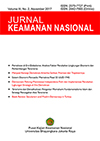Menyoal Konsep Demokrasi Amerika Serikat: Promosi dan Trajektorinya
Keywords:
Liberal offensive; conseptualisation peace-war; United State Unilateral Democracy; Absolute Relative Benefit.Abstract
Abstract
Post World War II and after Cold War period, international community
realized the importance to create a peaceful system without war. United
State as the winner of those wars has been accounted to have ability in
promoting democracy and global peace that prioritized offensive liberal
approach by optimizing the use of military approach pushed by his fear of his
hegemony position. In the same spectrum, the national interest of democracy
states are certainly more hurdle in getting benefit from being a democracy
state. Even though globalization effect has opened wide opportunity for
individual in democracy state to make a cooperation – military, economy,
and investment on social-culture with non-democracy state, such as China,
the share of benefit in geo-political between promoter of democracy and
democracy imported state are things to be anticipated by democracy state.
It is importance to review the process and relation character between
the imported democracy states with US, which in general begin through
mechanism and varieties of bandwagoning.
Downloads

Downloads
Published
Issue
Section
License
Please read and understand the copyright terms for submissions to this journal.
Copyright Notice
The Jurnal Keamanan Nasional is under the Creative Commons Attribution 4.0 International (CC-BY 4.0) License, according to which:
1) Authors retain copyright and grant the journal the right to first publication, with the work simultaneously licensed under the Creative Commons Attribution (CC-BY 4.0) that allows the sharing of articles published with the acknowledgement of authorship and the initial publication in this journal.
2) The authors are authorized to make additional contracts separately for distribution of the version of the work published in this journal (for example, publication in an institutional repository or as a chapter of the book), as long as there is recognition of authorship and initial publication in this journal.
3) Authors are authorized and encouraged to publish and distribute their work online (for example, in institutional repositories or on their personal pages) at any time before or during the editorial process, as it increases the impact and reference of the published work.












